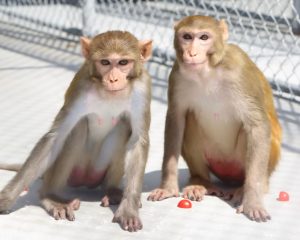Animal in Research
Texas Biomedical Research Institute’s Southwest National Primate Research Center has a long-standing commitment to treating its animals humanely and with the highest regard for their well-being. SNPRC works closely with regulatory agencies to determine best practices to enhance care provided to the primates, for the sake of the animals and the quality of the 
While some research questions may be adequately addressed using cell cultures, tissue studies or computer models (which we also employ at Texas Biomed and the SNPRC), research with animals continues to be critical for the advancement of human health. Disease processes are complex, involving multiple physiological processes and multiple organ systems that simply require the use of complex models.
Virtually every major advance in medical knowledge and treatment has involved research using animal models. Animal research has saved lives, extended life expectancy, and improved the quality of life for both humans and animals by enabling scientists to conduct critical experiments that identified ways to prevent, treat, and cure disease.
Although less than 0.5 percent of all animals used in research are primates, work with these animals is important to scientific understanding of human health and disease. Future medical progress depends on this continued research
Research involving animals is evaluated and monitored closely at the SNPRC. An internal IACUC committee of scientists, veterinarians and even a community member reviews all requests involving the use of animals in research and requires justification of the choice of animal to be used, the numbers of animals to be used and the proposed treatment of the animals. This committee also has the authority to prevent a research program from being initiated or to stop a research program if the committee determines that an investigator is not complying with the regulations or guidelines for the care and use of animals.
To understand the impact that animal research has had on all our lives, consider these examples of major medical breakthroughs that primate research has provided humanity:
- Most of the nation’s 1 million insulin-dependent diabetic individuals would not have insulin
- Sixty million Americans would risk death from heart attack, stroke or kidney failure from lack of medication for high blood pressure.
- Vaccines based on primate research have reduced the number of cases of polio in the United States from 58,000 to one or two per year.